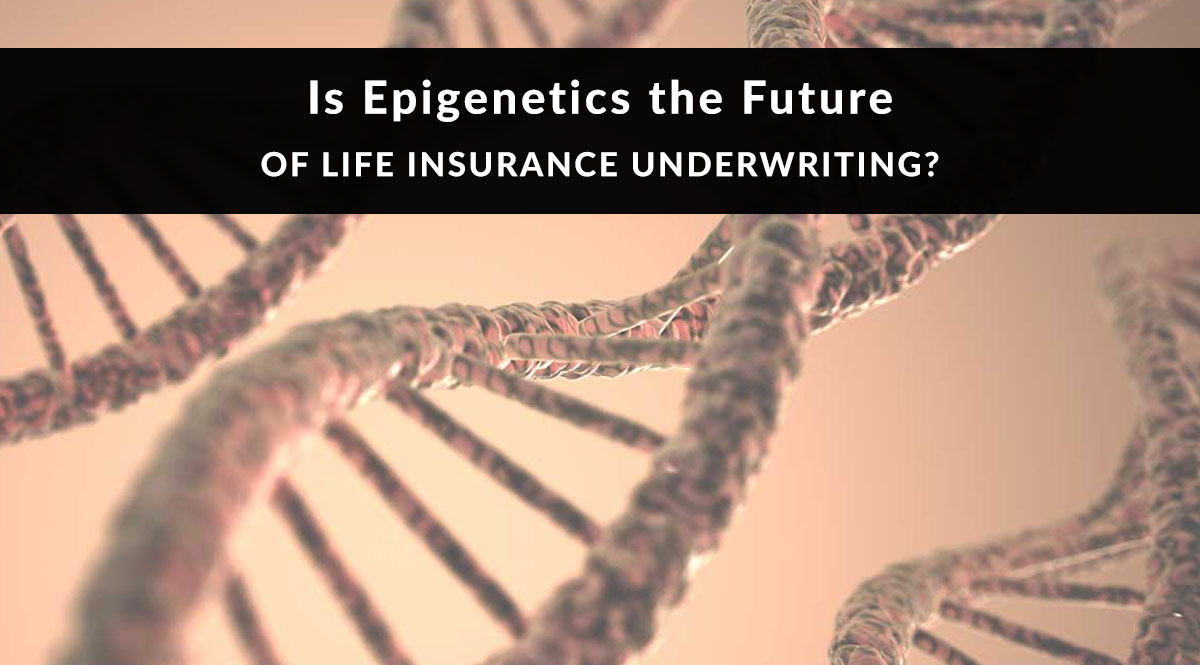
Being able to reproduce a person’s DNA profile lets us do everything from catch a killer to create a personalized cancer treatment. So why can’t it help us do a better job of life insurance underwriting?
It might be about to, thanks to epigenetics.
No time to read? Watch our video overview:
What Is Epigenetics?
Epigenetics is a branch of science that studies your genes – specifically, what activates and deactivates them.
DNA is a blueprint – it contains the instructions for building your organs and body parts.
Back in the day, you probably learned that DNA is a blueprint – it contains the instructions for building your organs and body parts. But there’s actually more to the story, and it has to do with how much of that blueprint is visible to a cell at any time. For example, if your entire DNA blueprint is encoded into every cell, how does a cell know if it’s supposed to become a skin cell or a bone cell?
It knows because of your epigenome.
The epigenome is a collection of chemical compounds that rest on or attach to your DNA. That’s where the prefix “epi” comes from—it means “above” in Greek. The epigenome makes sure cells only see the part of the blueprint they need, essentially “activating” or “deactivating” genes.
But here’s the thing.
Your epigenome isn’t set in stone.
Your epigenome changes during the course of your life, based on things like stress, lack of sleep, toxins, and an unhealthy diet.
It changes during the course of your life, based on things like stress, lack of sleep, toxins, and an unhealthy diet. A genetic side effect of these lifestyle choices? The production of compounds called methyl groups that attach themselves to your genes (the process is called “methylation”). These methyl groups can then influence which genes get turned on or off.
Epigenetics as a Predictor
So how do we get from knowing what an epigenome is to knowing what your epigenome is?
It’s relatively easy and inexpensive to sequence DNA based on a simple cheek swab. It’s the technology behind services like 23andMe and AncestryDNA. Saliva is great for sequencing DNA because it’s non-invasive, as opposed to a blood sample.
Sequencing DNA gives scientists a window into changes that have already occurred in a person’s epigenome. Remember those compounds called methyl groups? The more methylation you find in a DNA sequence, the more that person has triggered changes with lifestyle choices like smoking, drinking, stress, lack of sleep, poor nutrition, etc.
Long story short, your epigenome can provide information about your past behavior.
But it may also predict the future.
Scientists believe the number of methyl groups attached to your DNA could be a predictor of your lifespan.
Scientists believe the number of methyl groups attached to your DNA could be a predictor of your lifespan. You’ll see this described as the “epigenetic clock” or “Horvath clock,” named for Dr. Steve Horvath. A geneticist at UCLA, Horvath studied data on more than 13,000 tissue samples. He created an algorithm that analyzes methylation in multiple places on DNA, producing an age estimate that reflects a person’s epigenetics, not their calendar age.
Are you starting to see where this might be helpful in our industry?
Epigenetics As a Change Mechanism
But epigenetics may be useful for more than predicting longevity.
It may eventually give us the ability to halt or reverse aging.
Dr. Horvath analyzed the data from a small clinical trial where nine participants took a combination of growth hormone and diabetes medications for one year. He was surprised to learn that the average study participant moved back their epigenetic clock by 2.5 years. Even better, six of those nine participants provided a follow-up blood sample six months later. Their gains stuck around. The study’s findings were published in 2019.
And Dr. Horvath isn’t the only one making strides in epigenetics.
Dr. David Sinclair believes aging is just another disease – a treatable one, at that.
Dr. David Sinclair believes aging is just another disease – a treatable one, at that. A professor in the Department of Genetics at Harvard Medical School, he studies sirtuins, a type of gene he calls a longevity gene. These longevity genes make proteins that act like traffic cops, telling the body how to deal with adversity. Sinclair believes we need to figure out how to tap into these longevity genes and let them reverse the damage done by aging. In his recent book, Lifespan: Why We Age – and Why We Don’t Have To, Sinclair compares reversing the aging process to repairing a scratched DVD. The data is all there, he says – we don’t need to recreate it. We just need to recover it.
How Could Epigenetics Fit into Our Industry?
Because epigenetics is closely tied to longevity, many companies have talked about how it may eventually make its way to life insurance. Current life insurance underwriting (and pricing) is based on actuarial data. But what if we didn’t need massive databases to predict longevity? What if we could provide a more customized assessment of longevity for a client?
With the recent changes in underwriting due to the COVID-19 epidemic, now seems like a great time to consider how carriers can move forward without the need for a in-person medical exam. The timing couldn't be better to start taking a hard look at new underwriting methods, and not just as a temporary fix.
What do you think about the possibilities of epigenetics?
How can you see science informing our underwriting processes? Tell us in the comments!
